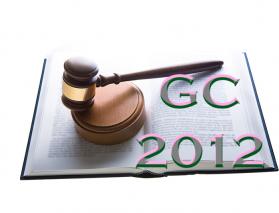My idealist vision of the hope of life after death? We acknowledge and act on the reality that the prophetic word of God emerges more from the uncomfortably marginalized than from the comfortably centered.

After a recent frost laid waste to a fair number of plants, I began the necessary clean-up. As I ripped up and discarded, my thoughts, as they almost always do when I am on my knees working in the dirt, turned to the nature of the church and the hopes of life after death that are necessary for future viability.
After dealing with the frost-burned and rotting annuals from various flowerpots, I headed to the fern bed in a shady, ever-damp portion of the yard. Our house sits near the bottom of a hill and the curve of the street means we get all the extra water when anyone uphill overwaters or heavy rains fall.
Thus, ferns grow almost promiscuously here, aggressively spreading from year to year. I hacked away, advancing on my knees, reminding myself how overdue this gardening task is. Under historical weather patterns, this fern, from the Autumn Forest fern family if I remember accurately, would have long since browned out and gone into its winter rest.
But, of course, climate change led to extended autumn warmth and the ferns continued to stay alive long past their normal lifespan. I was brutally cutting them close to the ground with a large pair of garden shears when something caught my eye: the frond of a newborn fern emerging from the surrounding death.
I will see hundreds of these emerging fronds in another ten weeks, but seeing one now shocked me. Again, we had a very hard freeze and everything around it was dead. And yet, this one survived.
Some things that I have been wrestling with concerning the United Methodist Church, and Christianity in general, started to emerge into greater focus.
The beginning of my own death process
Nearly three years ago now, I attended, as a member of the press, the specially called 2019 General Conference of The United Methodist Church. There, in a vote that left me and many others stunned, this denomination decided that they would continue to discriminate against those who do not fit the rigid sexual binary of “This is male and that is female and never, ever, shall the two move outside the tight boundaries of what we have defined as appropriate sexual orientation, dress, affections, and behavior for our never-to-be-changed-or-challenged understanding of ‘maleness’ and ‘femaleness’.”
At that point, I declared, “The UMC Has Just Died.” Sadly, something in me died at the same time.
I had long been a prolific and fairly widely read commenter about church issues in general and about the UMC in particular. I loved the UMC, intentionally walking into it as an adult after walking away from the hidden truths and outright lies that permeate much of the Evangelical world.
Those lies, coupled with the increasingly subtle but deeply ingrained misogyny (adapting to the fact that open hostility to women had became less socially acceptable), and increasingly open hostility to the LGBTQIA population (softened by nothing, based in fear) had previously shaped and warped my understanding of Christianity.
After a long and complicated process, made worse by the theological suspicion surrounding me because of my deep immersion in Evangelical theology, I was ordained as an Elder in the UMC and served with gratefulness. Even after retiring, my love for the UMC and for its mission remained strong and centered my life.
But GC2019 ended it for me. I have been unable to walk into any church since then, much less a United Methodist Church. I can no longer fathom calling something “Christian” that is characterized by such ignorance and dislike of that which is different.
I thought the UMC was indeed a large tent. What I discovered it that the leadership and decisions had been hijacked by the Evangelical wing, Southern Baptist in theological underpinnings, and far, far from being Wesleyan Methodists.
Furthermore, those who hijacked the UMC are sadly ignorant of church history. Never, ever in the history of religion has anything good come from marrying religious certainty to political power and that is exactly what the religious right, i.e., those who have orchestrated the current disastrous mess in the UMC, have done.
So, now what? Is there hope of life?
Strange as it is to say, the pandemic caused by the SARS-CoV-2 virus may be the best thing that could ever have happened to this once great denomination that so effectively changed society and the world for the better.
Among other things, the pandemic has exposed even more fully that the current organization/constitutional basis of our denominational structure can no longer function. At all.
 Since GC20012, when most key decisions made there were then overturned by the Judicial Council, I have known that the UMC was going to have to die. I wrote at the time,
Since GC20012, when most key decisions made there were then overturned by the Judicial Council, I have known that the UMC was going to have to die. I wrote at the time,
But the structure has cracked, and the unrepairable foundation now sits exposed. John Wesley was an autocratic organizational genius who could direct the clergy under his command and the churches of his movement to do things that are now not just unworkable, but also unthinkable.
And our own efforts at tinkering with the denomination we inherited? Well, we’ve danced around it, modified it, adapted it and culturally-contexed it. And have not been able to create meaningful reform. Time to stop. It’s over.
The pandemic has exposed this even further. We’ve not been able to have a General Conference, where all decisions about doctrine and structure must be made, since the disastrous 2019 GC.
GC 2020 was postponed to 2021, which was then postponed to 2022, and that is now in doubt with the emergence of the wildly contagious Omicron variant.
The Commission on the General Conference will need to make that decision by the end of March. Read this article to get a handle on the many factors that feed into that difficult decision.
The worst part about this? Until we actually meet in person, our structure denies us the right to hold a vote to start having virtual meetings. We are stuck.
To say that we are in an unworkable situation is such an understatement as to be patently ridiculous. We are in a significant constitutional crisis and with no readily discernable and legally legitimate way to untangle the mess.
On this point, I honestly don’t blame the Evangelical wing for their determination to get out. By creating the schism, they found the freedom necessary to re-write the structure of the denomination they will build.
If you dislike, hate, or in other ways find disgusting and/or unacceptable members of the LGTBQIA community but like to say you welcome them with open arms, then by all means join the exodus. But do so with integrity. Refrain from voting on structural issues vital to those who wish to stay and rebuild from the inside. They are no longer your concern.
But for those of us who trust the wideness of God’s grace and mercy, who recognize the glorious diversity and vitality of a genuinely open-armed theology grounded in the Wesleyan quadrilateral (*see definition at the end of this post), let’s embrace the damage that Covid has done, recognize that our way to doing church is now over, and let it go. Out of this sadness will come new life.
I’m aware I can be an idealist, but where better than the church to function that way? Isn’t this the one place that, above all, would honor and live out of the words of life that Jesus gave us, the place where we do practice and work toward perfection in loving God with all our being and loving our neighbors as we do our own selves?
Is the church not the place to gain the wisdom and learn the skills necessary to live out our baptismal vows?
Will we indeed renounce the spiritual forces of wickedness, reject the evil powers of this world, and repent of our sin?
Will we accept the freedom and power God gives us to resist evil, injustice, and oppression in whatever forms they present themselves?
Will we confess Jesus Christ as our Savior, put our whole trust in his grace, and promise to serve him as our Lord, in union with the Church which Christ has opened to people of all ages, nations, and races?
Furthermore, will we adhere to the General Rules of the United Methodist Church (for the original list of those rules, click here)?
Will we avoid evil and refrain from doing harm? As any student of church history knows, the amount of harm done that can be laid directly at the feet of those who proclaim Christianity boggles the mind. So, will we STOP DOING HARM?
Will we commence in doing good in all the ways we possibly can, to as many as we can, in every way we can?
Will we discipline our souls and our habits to stay in love with God?
Multiple governmental and non-profit agencies can and do work effectively on crucial societal issues. However, the church is the one and only place that has dedicated itself to the service and worship of God first as the core value of the service to the larger community.
Can we rekindle our first love and center ourselves firmly in the wideness of God’s grace?
My idealist vision of the hope of life after death
My hopes and dreams:
- We acknowledge and act on the reality that the prophetic word of God emerges more from the uncomfortably marginalized than from the comfortably centered.
- Because we acknowledge that those on the margins have value and must be heard, our gatherings no longer depend on quotas and counters to make sure all groups represented have not just freedom but active encouragement to speak.
- The practice of power-hoarding ceases.
- We respect and financially support the need for theological expertise and well-formed Christian ethics for those who occupy pastoral/teaching roles and who are called to live out of that unique place in the life of the church.
- We return to the basis of Wesleyan spirituality: deep and intentional accountability to one another.
- Operating within that accountability ethos, leadership positions go to those of proven character, not those of only deep pocketbooks or connections with people in power.
- Putting aside the need for big numbers, we create a healthy connectional structure that nurtures and supports localized ministry rather than the lone-ranger celebrity mindset that draws large crowds by small, inadequate theology..
- Recognizing the fear that the shape-shifting nature of contextualized theology causes, we address openly the concerns and discomforts that arise when confronted with growing information and uncomfortable situations.
Am I crazy to want these things?
Yes, likely I am. Again, it is the idealist in me, the part of me that, echoing John Wesley, has had one primary goal in life: to be a real Christian, to undertake the long and difficult process of becoming a formed and spiritually mature human being.
All need careful watch over the state of our souls. All will have to deal with the fears of being transparent and accountable to a selected group of others.
Truly, creating an environment based on caring for the least of these and living out of the mandate that the first must be last is not for the faint of heart.
Will it happen? Nope. Let’s face it: the first one who taught it/tried it was rejected, abandoned, and killed. So have many others. This really is the way of the cross. That cross which so many of us profess to honor and wear in symbol on our bodies but . . . which few of us are willing to carry and none willing to end up on.
And yet, we can aim in the right direction. And that means embracing the necessary winter death of The United Methodist Church and making room for spring life to flourish. Unless a seed falls into the ground and dies . . . well, the time has come for the UMC to give life.
*From the UMC website: The components or “sides” of the quadrilateral are (1) Scripture, (2) tradition, (3) reason, and (4) experience. For United Methodists, Scripture is considered the primary source and standard for Christian doctrine. Tradition is experience and the witness of development and growth of the faith through the past centuries and in many nations and cultures. Experience is the individual’s understanding and appropriating of the faith in the light of his or her own life. Through reason the individual Christian brings to bear on the Christian faith discerning and cogent thought. These four elements taken together bring the individual Christian to a mature and fulfilling understanding of the Christian faith and the required response of worship and service.
Photo Credit: © Christy Thomas, January, 2022. All Rights Reserved.













